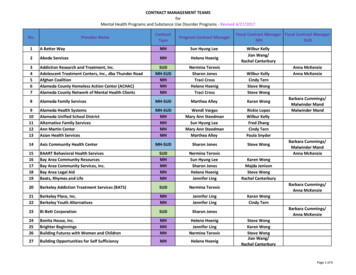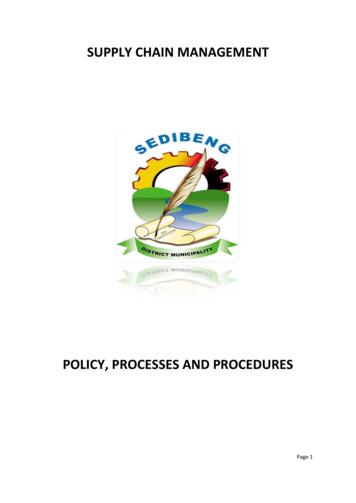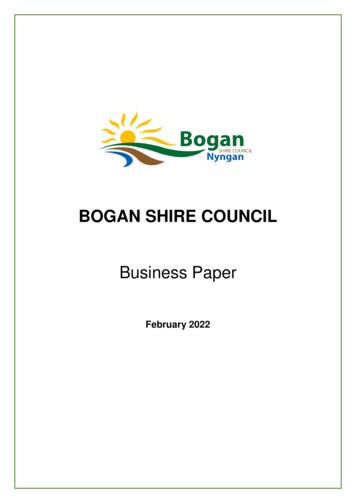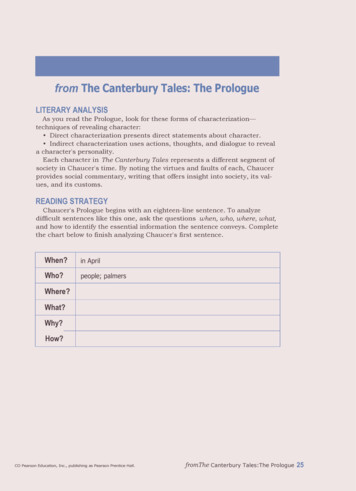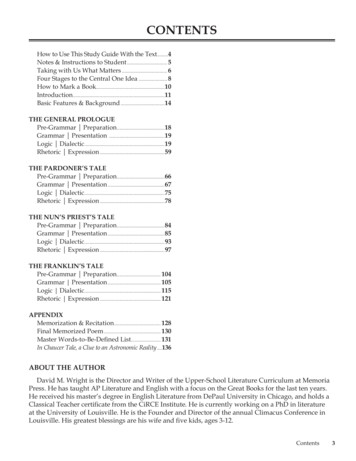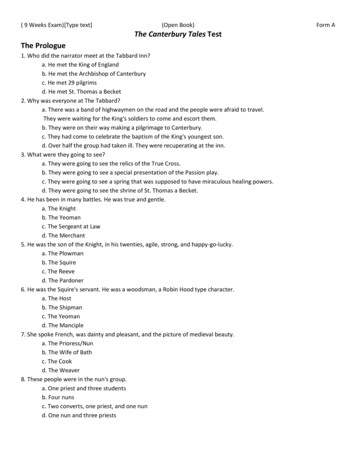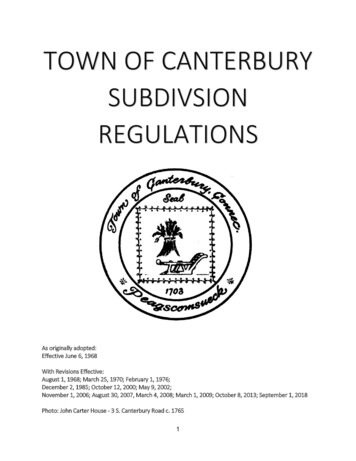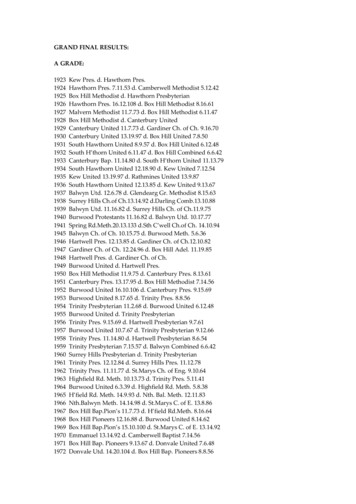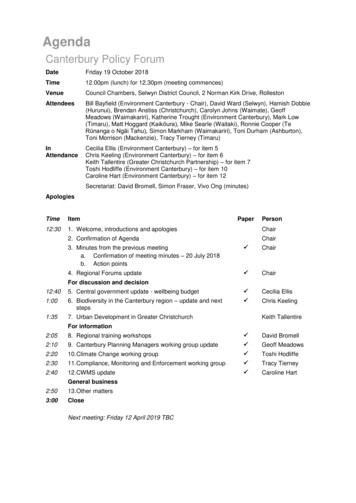
Transcription
AgendaCanterbury Policy ForumDateFriday 19 October 2018Time12.00pm (lunch) for 12.30pm (meeting commences)VenueCouncil Chambers, Selwyn District Council, 2 Norman Kirk Drive, RollestonAttendeesBill Bayfield (Environment Canterbury - Chair), David Ward (Selwyn), Hamish Dobbie(Hurunui), Brendan Anstiss (Christchurch), Carolyn Johns (Waimate), GeoffMeadows (Waimakariri), Katherine Trought (Environment Canterbury), Mark Low(Timaru), Matt Hoggard (Kaikōura), Mike Searle (Waitaki), Ronnie Cooper (TeRūnanga o Ngāi Tahu), Simon Markham (Waimakariri), Toni Durham (Ashburton),Toni Morrison (Mackenzie), Tracy Tierney (Timaru)InAttendanceCecilia Ellis (Environment Canterbury) – for item 5Chris Keeling (Environment Canterbury) – for item 6Keith Tallentire (Greater Christchurch Partnership) – for item 7Toshi Hodliffe (Environment Canterbury) – for item 10Caroline Hart (Environment Canterbury) – for item 12Secretariat: David Bromell, Simon Fraser, Vivo Ong (minutes)ApologiesTimeItemPaperPerson12:301. Welcome, introductions and apologiesChair2. Confirmation of AgendaChair3. Minutes from the previous meetinga. Confirmation of meeting minutes – 20 July 2018b. Action points Chair4. Regional Forums update ChairFor discussion and decision12:405. Central government update - wellbeing budget Cecilia Ellis1:006. Biodiversity in the Canterbury region – update and nextsteps Chris Keeling1:357. Urban Development in Greater ChristchurchKeith TallentireFor information2:058. Regional training workshops David Bromell2:109. Canterbury Planning Managers working group update Geoff Meadows2:2010. Climate Change working group Toshi Hodliffe2:3011. Compliance, Monitoring and Enforcement working group Tracy Tierney2:4012. CWMS update Caroline HartGeneral business2:5013. Other matters3:00CloseNext meeting: Friday 12 April 2019 TBC
Canterbury Policy ForumDraftMinutesDate:Friday 20 July 2018 at 12.30 pmVenue:Council Chamber, Selwyn District Council, RollestonAttendance:David Ward (Chair - acting), Judith Batchelor (for Hamish Dobbie), Toni Durham, Mark Low, Tracy Tierney, Simon Markham, Geoff Meadows,Ronnie Cooper, Toni Morrison, Matt Hoggard, Katherine TroughtNeville Reilly (CDEM Group Controller) & Mike Gillooly (Christchurch City Council) (for item 4)Environment Canterbury: David Perenara-O’Connell, Manaia Cunningham (for item 5), Sam Elder (for item 7)Secretariat: Simon Fraser, David Bromell, Louise McDonald (minutes)Apologies:Bill Bayfield (Environment Canterbury), Carolyn Johns (Waimate), Hamish Dobbie (Hurunui)AGENDAITEMKEY POINTS DISCUSSED / RESOLVED1.David Ward welcomed everyone to the meeting and advised that he would chair the meeting in BillBayfield’s absence. He welcomed Toni Durham from Ashburton to her first Policy Forum.2.Confirmation of agenda – the agenda was confirmed and no other matters raised.3.Minutes from 6 April 2018 were approved with the following revised wording provided by RonnieCooper for item 4: Ngāi Tahu update.Ronnie Cooper spoke to a PowerPoint presentation (notes tabled) and circulated the relevantextract from the Resource Management Act and a flow diagram illustrating the Mana Whakahonoā Rohe/Iwi Participation Arrangement Initiation Process. The legislation includes time deadlinesfor the stages of the formal process, and Ronnie recommended that councils begin discussionswith Ngāi Tahu before the formal process is initiated. It is better to take time and get the processright.Existing Memoranda of Understanding can be used as a starting point for discussion with thePapatipu Rūnanga, but those documents will need to be developed further to meet therequirements of a Mana Whakahono a Rohe Agreement.Canterbury Policy Forum - 19 October 2018 - Page 1 of 40ACTION POINTS (Who will action, when?)
AGENDAITEMKEY POINTS DISCUSSED / RESOLVEDRonnie advised that there are two options in the legislation, for an Agreement with the iwi authorityor with hapū. Ngāi Tahu has legal advice that hapū level Agreements may not be as robust as onewith an iwi authority, or cover the full range of RMA matters. Te Rūnanga o Ngāi Tahu intends towork with the Papatipu Rūnanga to ensure that Mana Whakahono a Rohe Agreements recognizeand provide for the mana of the Papatipu Rūnanga and their priorities, while providing themaximum legal certainty.There were no other matters arising from the minutes.4.Earthquake Recovery – Symposium and Technical Advisory Group (TAG) ResponseNeville Reilly spoke to a PowerPoint presentation on the Ministerial Review: Better Responses toNatural Disasters and Other Emergencies in New Zealand, carried out by a technical advisorygroup (TAG) led by Roger Sowry. The Minister has consulted with stakeholders on the report andan TAG Implications Project Team is developing a report for the Minister before therecommendations are considered by Cabinet. There are likely funding implications.Mike Gillooly provided an update on the Canterbury Earthquake Symposium to be held on 29 and30 November 2018 at the University of Canterbury. The symposium is being arranged jointly bythe Christchurch City Council and the Department of the Prime Minister and Cabinet and will havea strong academic component. He invited submissions of expressions of interest for abstracts forthe Symposium by 27 July through the earthquake recovery website.5.Tuia and Ngāi Tahu engagementManaia Cunningham spoke to a PowerPoint presentation that described the SharePoint Platformthat Environment Canterbury uses with the Tangata Whenua Advisory services that are contractedto provide professional advice on tangata whenua issues across Canterbury, including resourceconsent applications. This streamlines how Environment Canterbury works with these entities andprovides accurate cost recovery information. Environment Canterbury was offering to work withthe Councils to establish the platform for them.There was interest in the platform, but more information was requested particularly on the ITrequirements before the other Councils could consider taking up this offer.ResolvedThat the Canterbury Policy Forum:1. Agree in principle that a SharePoint Platform can add value to a relationshipbetween Territorial Authorities and Papatipu Rūnanga; andCanterbury Policy Forum - 19 October 2018 - Page 2 of 40ACTION POINTS (Who will action, when?)
AGENDAITEMKEY POINTS DISCUSSED / RESOLVED2. Agree to provide names of staff from member Councils to work with EnvironmentCanterbury to identify the costs and benefits (including time saved and efficiency)of the proposal and report back to the next Policy Forum meeting.David Ward/Ronnie Cooper6.Biodiversity in the Canterbury region – update and next stepsGeoff Meadows presented this report, noting that it was still work in progress, and invitedcomments from the Forum.Concern with the decline in biodiversity in Canterbury had been raised in submissions to someCouncil’s Long-Term Plans. The need for political support from the Councils was noted,particularly around concerns about biodiversity on private land. It was agreed to take the issue ofstrengthening biodiversity to the Mayoral Forum.Ronnie Cooper advised that the iwi chairs will be looking at the biodiversity framework for manawhenua and how it will align with climate change and freshwater management.ResolvedThat the Canterbury Policy Forum:1. Note the biodiversity in the Canterbury region – update and next steps report.2. Agree to report to the Canterbury Mayoral Forum recommending support for theongoing development of a strengthened regional approach to biodiversity,including work to assess future options for the Canterbury Biodiversity Strategy.Geoff Meadows/Toni Morrison7.Climate Change updateSam Elder spoke to a PowerPoint presentation that provided an overview of National Policy andGuidance and the Canterbury Climate Change Working Party.In November 2016 the Cabinet agreed to establish the Climate Change Adaption TechnicalWorking Group (CCATWG) to provide advice to the Government on adapting to the impacts ofclimate change. The Ministry for the Environment has developed Coastal Hazards & Climate:guidance for local government. The short timeframes provided for submissions to Governmentwas raised as was the lack of a National Coastal Policy Statement .The Canterbury Climate Change Working Group, led by Stefanie Rixecker, would welcome anyfeedback. Their 2018 work programme includes:Knowledge regarding climate change Community resilience Hazards, sea level rise and flooding Canterbury Policy Forum - 19 October 2018 - Page 3 of 40ACTION POINTS (Who will action, when?)
AGENDAITEMKEY POINTS DISCUSSED / RESOLVED8.Policy Forum training opportunitiesDavid Bromell presented this report on options for joint training of policy and planning staffdeveloped with Nicole Randall (Christchurch).ResolvedThat the Canterbury Policy Forum:1. indicate interest in running sub-regional workshops on ‘Thinking together before we write’ during August–October 20182. indicate interest in a train-the-trainers workshop on peer review and writingrecommendations early in 20193. note the delay in the release of data from Census 2018 and ask the Secretariat toorganise a regional workshop for the first half of 2019 on using population data inpolicy and planning4. agree to draw on the Policy Forum training budget to cover any catering, printingand facilitator travel costs for training events organised for the Policy Forum.Toni Durham / Simon Markham9.Canterbury Planning Managers Group updateGeoff Meadows presented this report. He noted that ECan are leading a regional response on Perand Poly-fluorinated Alkyl Substances (PFAS) contamination, and Councils should to engage withthis. PFAS are in some fire-fighting foam that have been raised as an issue of concern.ResolvedThat the Canterbury Policy Forum:1Note the Canterbury Planning Managers Group’s efforts to respond to the LGNZ thinkpiece Addressing New Zealand’s Biodiversity Challenge.2Note that the Canterbury Planning Managers Group will prepare a draft regionalresponse for the Mayoral Forum’s consideration on the draft National PlanningStandards (deadline 17 August 2018).3Note that there has been no PFAS (Per and Poly-fluorinated Alkyl Substances)contamination plans developed by Canterbury Territorial Authorities or thinking abouttesting for PFAS contamination.Geoff Meadows/Matt HoggardCanterbury Policy Forum - 19 October 2018 - Page 4 of 40ACTION POINTS (Who will action, when?)
10.Compliance, Monitoring and Enforcement working groupTracy Tierney presented this report, and the Canterbury Strategic Compliance Strategy (17 July2018) that had been circulated separately. Tracy thanked everyone for their support for this work.ResolvedThat the Canterbury Policy Forum:1. Recommend the Canterbury Strategic Compliance Framework to the Chief ExecutivesForum.Tracy Tierney/Toni Morrison11.Canterbury Water Management Strategy (CWMS) updateKatherine Trought presented this report, highlighting the project to ensure that the CWMS is fit forthe future needs of the region.Input from the Councils for the next CWMS report, that will go to CE and Mayoral Forums, wasinvited.The issue of responsibility and duty of care with regard to shallow private wells across the regionwas raised – this question had also been raised within work on Three Waters, with no clearanswer.12.Other matters –Three WatersSimon Fraser advised that the Central government review of Three Waters, being led by DIA, hasbecome a priority issue across the regional forums. A stocktake and next steps for Three Waterspaper will be provided to the next Chief Executives Forum, before going to the Mayoral Forum.This is intended to prepare Mayors and CEs to respond outcomes and Cabinet decisions on theThree Waters review, expected in October.David Ward reported that at the LGNZ Conference that the Minister had signalled that affordabilitywas no longer an excuse for non-compliance for drinking water standards. This will have animpact on many communities, particularly those that are under resourced.The Productivity Commission’s inquiry into local government funding will also be a factor for thisissue. David Ward welcomed the inquiry and recommended the Group to look at the Shand reportof 2007.David also recommended looking at the LGNZ site tor information of the concept of localism thatwas also raised at the LGNZ Conference.Canterbury Policy Forum - 19 October 2018 - Page 5 of 40
Long Term PlansThe Group shared their experiences of the recent LTP process. Simon Markham shared acautionary tale concerning a split vote that reinforced the need to have a plan in place when thereis no ‘status quo’ for a split vote on a controversial matter.The meeting closed at 2.50 pmNext Meeting: Friday 19 October 2018Canterbury Policy Forum - 19 October 2018 - Page 6 of 40
Canterbury Policy ForumItem 419 October 2018Date:Presented by: Simon Fraser, Regional Forum SecretariatCanterbury Regional Forums updatePurpose1.This paper provides an update on the Canterbury Chief Executives Forum andCanterbury Mayoral Forum meetings since July 2018.RecommendationsThat the Canterbury Policy Forum:1.note the updates from the Chief Executives and Mayoral Forum meetingssince July 2018Chief Executives Forum2.The Chief Executives Forum met on 6 August 2018, hosted at Selwyn District Council.Key agenda items were: discussion on the central government review of Three Waters. This includedreceiving a draft stocktake of Three Waters assets across Canterbury, and howCanterbury should position itself to respond to upcoming announcements fromcentral government. update on the implementation of the Canterbury Regional Economic DevelopmentStrategy (CREDS). This included:oupdates on the 3-year work programmeothe CREDs quarterly project reportoupdates on Canterbury applications to the Provincial Growth Fund. an update on regional transport priorities across Canterbury. This includedreceiving an update on the CREDS Transport workstream, updates on centralgovernment transport initiatives, and how the Canterbury Regional TransportCommittee is responding to the changes announced in the Government PolicyStatement on Regional Transport. an update on the Canterbury Water Management Strategy (CWMS)implementation the regular report from the Policy, Corporate and Operations Forums on their thirdcycle of meetings for 2018.Canterbury Policy Forum - 19 October 2018 - Page 7 of 40
3.The next Chief Executives Forum will be on 5 November 2018.Mayoral Forum4.On 6 September, the evening prior to the Mayoral Forum meeting, Mayors and ChiefExecutives met for a working dinner. Mayor Craig Rowley facilitated discussion onvalue-added production, one of seven priorities in the Canterbury Regional EconomicDevelopment Strategy.5.Invited guests were Murray Strong (Chair, Lincoln University – AgResearch JointFacility), Anna Elphick (ChristchurchNZ), David Rendall and Helen Wyn (SeniorRegional Official for Canterbury).6.David Rendall has been facilitating workshops in each district as part of multi-yearprojects to boost value-added production in Canterbury. These projects are beingdelivered for the Mayoral Forum by the University of Canterbury and ChristchurchNZ.7.The Mayoral Forum met on 7 September 2018, hosted at Environment Canterbury. The Forum reviewed the current state of 3 Waters management in Canterbury. TheOperations Forum, Drinking Water Reference Group, Engineering Managers andStormwater Forum assisted Chief Executives with this stocktake. The MayoralForum requested further analysis of capital expenditure to ensure we have anaccurate and consistent snapshot of our current state. Mayors Dalziel, Ayers and Rowley will work with Chief Executives and thesecretariat to shape and refine a potential Mayoral Forum response to proposalsemerging from the Government’s 3 Waters review. Joanna Norris (ChristchurchNZ) presented the CREDS economic indicators report(August 2018). This includes regional transport indicators for the first time. Tim Loftus (ChristchurchNZ) presented progress in developing the Canterburystory, to attract and retain talent and business to the region. Steve Lowndes (Environment Canterbury) reported great progress over winter2018 in meeting National Environmental Standards for Air Quality across theregion. Hon Dr Megan Woods met with the Mayoral Forum for discussion focusing onresearch, science and innovation and value-added production.8.Following the meeting, Canterbury MPs joined the Mayoral Forum for a presentation onthe Mayoral Forum’s priorities and progress on implementing the triennial agreementand the CREDS in this local government term.9.The next Mayoral Forum meeting will be held on 6 & 7 December.Canterbury Policy Forum - 19 October 2018 - Page 8 of 40
Canterbury Policy ForumItem 519 October 2018Date:Presented by: Cecilia Ellis, Strategic Policy, Environment CanterburyGovernment’s Wellbeing approachPurpose1.This paper is to brief the Forum on the Government’s Wellbeing approach, which hasimplications for how we make decisions, monitor and report progress and advocate.Understanding how Government decisions are being made will help us influence issuesand priorities affecting Canterbury.RecommendationsThat the Canterbury Policy Forum:1.discuss the Government’s Wellbeing approach and potential implications forthe Canterbury regional forums.Background2.The Government wants to look beyond traditional GDP and economic growth targets,and instead focus on improving the wellbeing of New Zealanders through productive,sustainable and inclusive growth (a ‘Wellbeing approach’). This means a focus onmeasuring Government performance by how well it improves the current and futurewellbeing of New Zealanders. The Government considers this will improve decisionmaking around wellbeing and sustainability and increase accountability to the public.3.The Government’s Wellbeing approach has four components:4. establish a comprehensive set of indicators that are enduring and providetransparency around wellbeing of New Zealanders take a broader and more rigorous approach to consider the different componentsthat contribute to wellbeing, recognising trade-offs and dependencies across thesecomponents, in the shorter and longer term make strategic and collectively owned choices on complex issues, and balancecurrent and future wellbeing needs consider how the public sector operates to deliver wellbeing improvements.To achieve this, Government have an ongoing programme of work, consisting of: Treasury’s development of a Living Standards Framework, dashboard andreport. The framework aims to provide a more comprehensive picture of wellbeingCanterbury Policy Forum - 19 October 2018 - Page 9 of 40
to ensure that government advice and decisions are influenced by more than justfinancial measures. It contains current wellbeing indicators of New Zealandersbased around 12 domains, distribution of wellbeing across the population andindicators of future wellbeing based on the four capitals. Stats NZ development of a set of comprehensive indicators, known as IndicatorsAotearoa New Zealand (IANZ), to align with and inform Treasury’s LivingStandard dashboard. IANZ will also inform a range of domestic domain reporting(e.g. environmental reporting), inform international reporting and New Zealand’simpact on the rest of the world (e.g. the UN’s sustainable development goals), andvarious sector and agency strategies (e.g. the child wellbeing strategy). work to present Budget 2019 as ‘ the Wellbeing budget’, where the Wellbeingapproach will be used to inform investment priorities and spending decisions.5.Attachment 1 explains how the components of the Wellbeing approach work together.6.The development of the Wellbeing approach is iterative and will be progressed overtime to make sure the framework and IANZ are enduring in the New Zealand context. Inparticular, Treasury is progressing work to incorporate cultural/Te Ao perspectivesacross the four capitals, and the next iteration of the framework will consider the role ofculture, including Māori culture as part of the capitals approach in more detail.What does this mean for local government?7.The Wellbeing approach holds significant potential for the way we make decisions,although the implications will emerge as the approach is developed. Possibleconsiderations include: changes in the way we shape our advice when influencing government policy andbudget decisionsCanterbury Policy Forum - 19 October 2018 - Page 10 of 40
opportunities for how we incorporate wellbeing into our decision-making, reportprogress and demonstrate balance between economic development andenvironmental protection opportunities to address current data and information gaps and strengthen regionaland sub-regional sector information potential changes to what we monitor and report on.Next steps8.The first set of IANZ are expected to be released towards the end of 2018 and final setof indicators available by early 2019. Stats NZ are currently consulting on theseindicators to ensure they are meaningful for the public.9.Treasury will also publish an interim Living Standards dashboard by the end of the year.They intend to publish an annual Living Standards report and this will inform theWellbeing Budget 2019.Attachments Attachment 1 – Components of the Wellbeing approachCanterbury Policy Forum - 19 October 2018 - Page 11 of 40
Canterbury Policy Forum - 19 October 2018 - Page 12 of 40
Canterbury Policy ForumDate:19 October 2018Presented by:Chris Keeling, Environment CanterburyItem 6Biodiversity in the Canterbury region – update and next stepsPurpose1.This paper provides an update on the ongoing biodiversity conversation through theCanterbury Planning Managers Group and outlines a package of work to develop acollective approach to biodiversity management in Canterbury.RecommendationsThat the Canterbury Policy Forum:1.note the content of this report2.agree to support the outlined package of work3.agree to this paper being presented at the CEs Forum on 5 November 2018.Background2.Our native flora and fauna is a taonga that does much to define us as a nation. Goodprogress is being made in some areas of biodiversity management throughoutNew Zealand, aided by effective new technology and greater public, corporate andphilanthropic attention to and investment in the environment. But business as usual willnot be good enough if we are to maintain our unique indigenous biodiversity. It is underthreat, and we are losing ground in many cases.3.The Local Government New Zealand (LGNZ) thinkpiece, Addressing New Zealand’sBiodiversity Challenge, released last year recommends five key shifts that need to bemade to start addressing the biodiversity challenge. These include: the need for strong leadership and clarity of roles and responsibilities the need to agree where we should focus our efforts at national, regional and locallevel the importance of a national plan and delivering joined-up action across all players the need to understand what success looks like, and how to measure it the need for modern, fit-for-purpose frameworks, including legislation, to helpachieve our goals.Canterbury Policy Forum - 19 October 2018 - Page 13 of 40
4.Through previous papers in February and July 2018, the Policy Forum was provided withbackground on the emerging significance of biodiversity both nationally and withinCanterbury. This included: background on the emerging significance of biodiversity at a national, regional andlocal level highlighting the important role of territorial authorities in meeting the biodiversitychallenge updating the Policy Forum on Environment Canterbury’s biodiversity content in thecurrent Long-Term Plan (the ‘step change’) proposing that a refreshed Canterbury Biodiversity Strategy could be a keymechanism to drive a stronger regional approach to biodiversity for Canterbury.A changing national, strategic context5.National biodiversity policy is gaining momentum with initiatives from both the Ministry forthe Environment and the Department of Conservation (DOC).6.The Biodiversity Collaborative Group – the group tasked with drafting a National PolicyStatement on Indigenous Biodiversity (NPSIB) – has now drafted and deliveredrecommendations to the Associate Minister for the Environment. Officials will continue towork on this in the coming months.7.Alongside this, DOC will be reviewing the New Zealand Biodiversity Strategy 2000-2020with the intent of providing refreshed over-arching national direction and aligning with theNPSIB. This will consider the five key shifts developed through the LGNZ thinkpiece andprovide clarity of roles and responsibilities of all biodiversity players. DOC aims to delivera revised strategy by December 2019.Canterbury context8.Canterbury biodiversity management requires a coordinated and cooperative approachfrom the many agencies and organisations with responsibilities for biodiversity, and fromcommunities, individuals and landowners across the region. Figure 1 identifies some ofthe key roles and responsibilities. Environment Canterbury is focussed on freshwaterhabitats and the coastal marine environment, while territorial authorities have the role ofmanaging terrestrial habitats.9.Both Environment Canterbury and territorial authorities are generally active in playingtheir roles in biodiversity management, albeit to varying degrees – there is a lot of workhappening across the region.10. However, progress can be hampered by resourcing challenges, lack of clear priorities,poor alignment between players, and political willingness.11. Councils have identified future projects that could support biodiversity outcomes. A coordinated approach with greater strategic alignment across the region could furtherCanterbury Policy Forum - 19 October 2018 - Page 14 of 40
support the work being undertaken by councils in the region. Better data and monitoringwould support better prioritisation and reporting at local and regional levels.ECanTangataWhenua- freshwaterhabitats (lakes,rivers, wetlands)- matauranga,kaitiakitanga,action, advocacy,advicecoastalmarine areaTAsCommunitygroups / Landowners- terrestrialecosystems &habitats- action on groundCBO/Advocacy& IndustryGroups- action &advocacy,funding, adviceDOC- indigenousspecies, fish &freshwaterhabitats, DOClandLINZ- Crownproperty,management,valuationFigure 1 Roles and ResponsibilitiesThe Canterbury Biodiversity Strategy12. The Canterbury Biodiversity Strategy, released in 2008, established a strategic approachto biodiversity in the region with a vision to protect, maintain and restore Canterbury’sindigenous biodiversity.13. The 18 signatories include Environment Canterbury, eight district councils, two centralgovernment departments (LINZ and DOC) and Te Runanga ō Ngāi Tahu.14. The strategy sets out a series of goals and targets that aim to halt the decline ofbiodiversity across the region, including on-the-ground action, monitoring, research andcommunications.15. As it stands, the Canterbury Biodiversity Strategy is broadly aligned with national andlocal aspirations and initiatives, such as Predator Free 2050. It has also beenincorporated into regional and district plans, policies, and related documents, and it is stillreferenced by agencies and NGOs in strategic documents and funding applications.16. Environment Canterbury has recently engaged with the signatories to the CanterburyBiodiversity Strategy to understand:Canterbury Policy Forum - 19 October 2018 - Page 15 of 40
the value of the Strategy as it stands how they had implemented the Strategy challenges for the implementation of the Strategy/biodiversity protection inCanterbury their thoughts on the future of the Strategy.17. Overall, the consensus from these discussions is that the Strategy’s vision, goals, andhigh-level targets are still relevant, and the Strategy is valuable. However, it has been achallenge to give meaningful effect to the Strategy. Reasons for this include a change inpolitical priorities, a lack of regional ownership and clear leadership, and, most of all, thelack of a clear implementation plan.Developing a regional approach for Canterbury18. As a region, we have an opportunity to set ourselves up to respond to the changingnational strategic environment. A refreshed Canterbury Biodiversity Strategy andaccompanying implementation plan would be a promising vehicle to drive this.19. An implementation plan will be developed alongside the Strategy to bring together theexisting workstreams of all players with better strategic links, ensuring alignment of workacross the region to help achieve the goals of the Strategy. Territorial authorities will havea significant role to play in this.20. A refresh also provides the opportunity to reassess how we collectively approachbiodiversity management, including building relationships and working with landowners,the appropriate use of regulation, local flexibility and collective monitoring and datamanagement.21. Another key implementation challenge that will need to be addressed is the lack of asingle point of ownership. The Strategy is a region-wide strategy, currently adopted bymultiple agencies and organisations and there are more organisations for whom it couldbe relevant. The Mayoral Forum will likely be considered as an option for providing thenecessary leadership to advance the Strategy, similar to the Canterbury WaterManagement Strategy.22. Ultimately, successful delivery of the strategy and implementation plan could and shouldbe the platform to tell a compelling story to seek and encourage greater externalinvestment in biodiversity on behalf of ‘Canterbury Inc.’.Canterbury Policy Forum - 19 October 2018 - Page 16 of 40
23. The following package of work is proposed:a. Refreshed CanterburyBiodiversity Strategyb. Implementation planc. Governance and supportingstructure Streamlined process Minor overhaul Reaffirm existing support and gather additionalsupport Clear priorities Cl
Central government update - wellbeing budget Cecilia Ellis 1:00 6. Biodiversity in the Canterbury region - update and next steps Chris Keeling 1:35 7. Urban Development in Greater Christchurch Keith Tallentire For information 2:05 8. Regional training workshops David Bromell 2:10 9. Canterbury Planning Managers working group update Geoff Meadows
